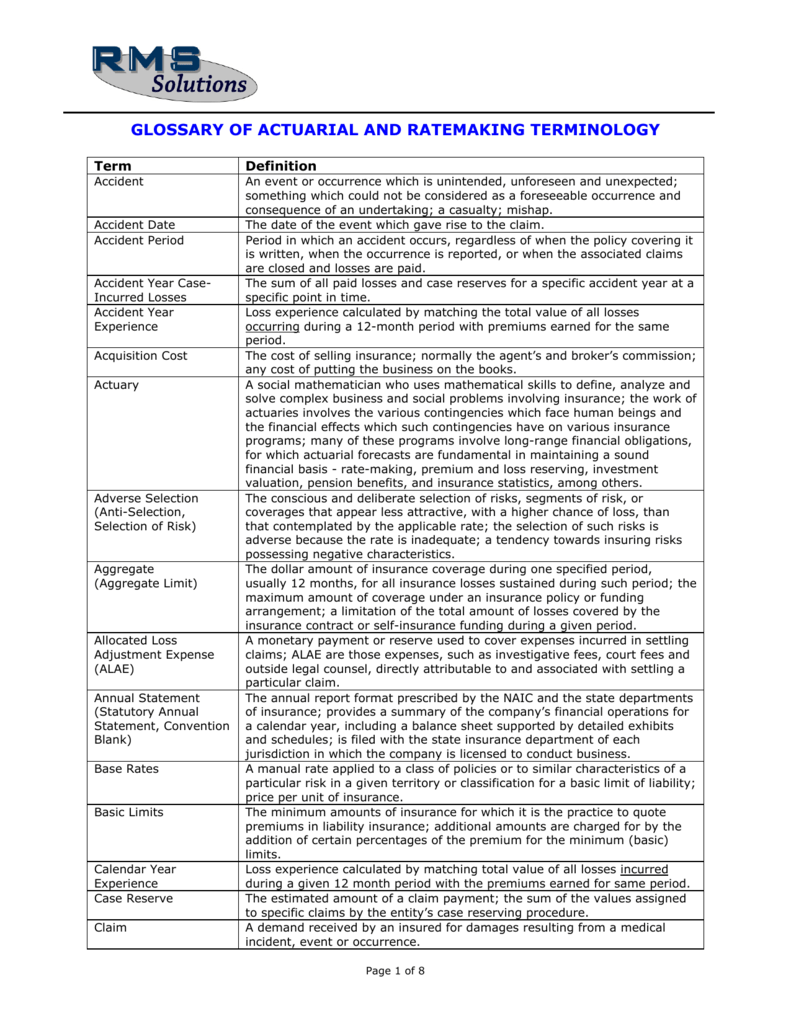Why should you become an actuary?
by Michaella
Posted on 30-12-2020 11:56 AM

The room was packed. I’d guess almost 1,000 people came to hear thought leaders james guszcza, fcas, of deloitte and david ingram, fsa, of willis towers watson talk about data science and behavioral science at the cas annual meeting in anaheim. They were talking, at least it sounded to me as i considered it and went back through my notes, about what it means to be an actuary today.

An actuary is a business professional who deals with the measurement and management of risk and uncertainty.
Robert l. Brown april/may 2017 as i booked my flight for cape town last may, little did i know that there would be two purposes to my trip. At that time, i had a single focus: to attend the semi-annual meetings of the international actuarial association (iaa). It was soon thereafter that i was asked to join the board of contributing editors of the actuary. At our board meeting in july, we mapped out six general topics upon which our six 2017 issues would focus, and divided the responsibility for each issue to a member of the board. I was chosen to head up an issue that would focus on actuaries in banking.
An actuary is a professional who deals with risk. Using statistics they develop predictions about bad things that might happen. The larger the base of statistics, the more accurate are their predictions. Life insurance actuaries have centuries of data to tap. Their statistics are invaluable to measure the impact of certain diseases and conditions on life expectancy.
Chevron up if you’re unsure about what salary is appropriate for an actuary position, visit indeed's salary calculator to get a free, personalized pay range based on your location, industry and, experience. Was this answer helpful?.
/ actuarial science , actuary , career planning , jobs despite its reputation for being a boring, nerd-friendly, desk-bound job, a career in actuarial science can bring excitement to those who enjoy crunching numbers and applying statistical analysis to solve real business problems. From predicting the outcomes of business strategies to advising higher-ups in making sound financial decisions, it can be a fulfilling career.
A Fellow of the Society of Actuaries (FSA):
Either the society of actuaries (soa) or the casualty actuarial society (cas) must certify actuarial analysts. To reach the first or associate level of certification, an actuary must pass seven exams in the cas or five exams in the soa. This process usually takes 4-6 years, but students typically begin taking exams while still in school and start their first job after passing one or two exams. The second, or fellowship, level takes an additional 2-3 years to achieve. Continuing education seminars are required to maintain certification. Their employers may cover certification costs for actuarial analysts.
/17039943563_ebf090d9e4_o-ea8dd88efbbf43fb95d2132869c129fd.png)
Why would I want to be an Actuary?
Investment management
actuaries have been involved in the field of investment management for decades.
 They are involved in buying and selling assets, investment analysis and portfolio management. In addition, actuarial techniques are ideal for use in measuring investment performance. Corporate finance
although generally regarded as the province of the investment banker, actuaries can add value in this area. An actuary’s basic skills in forecasting and assessing risks are ideal for estimating whether a capital project, such as a new hospital, is financially viable. Employers might include government departments, management consultancies, or property companies specialising in this area.
They are involved in buying and selling assets, investment analysis and portfolio management. In addition, actuarial techniques are ideal for use in measuring investment performance. Corporate finance
although generally regarded as the province of the investment banker, actuaries can add value in this area. An actuary’s basic skills in forecasting and assessing risks are ideal for estimating whether a capital project, such as a new hospital, is financially viable. Employers might include government departments, management consultancies, or property companies specialising in this area.
Alternate job titles: actuarial analyst i | associate actuary | entry actuary | entry level.
An actuary is a professional who deals with the measurement and management of risk and uncertainty. The mathematics and finance needed to scientifically measure – and mitigate – risks have their origins in the 17th century studies of probability and annuities. Actuaries use advanced skills developed primarily in mathematics, particularly calculus-based probability and mathematical statistics, and for this reason actuaries are essential to the re/insurance industries in london and bermuda.
Examples from literature from these figures a firm of manchester actuaries has drawn the startling conclusion that bond street is more used by women than by men. I asked an eminent actuary the other day to make me some calculations. This was on the day before the actuaries were to make their investigation.
Actuary i conducts analysis, pricing and risk assessment to estimate financial outcomes. Applies knowledge of mathematics, probability, statistics, principles of finance and business to calculations in life, health, social, and casualty insurance, annuities, and pensions. Being an i develops probability tables regarding fire, natural disasters, death, unemployment, etc. Based on analysis of statistical data and other pertinent information. Typically requires a bachelor's degree. Additionally, actuary i typically reports to a supervisor or manager. The funny actuary gifts retired actuary gifts gifts for actuary funny i works on projects/matters of limited complexity in a support role. Work is closely managed. To be an actuary i typically requires 0-2 years of related experience. (copyright 2020 salary. Com) view full job description.
When i meet someone for the first time, they often ask what i do for a living. When they find out i am an actuary, they often ask, “what is that?†i used to say, “we are mathematicians who work for insurance companies†or something like that, which usually prompts the person to either change the subject or look for someone else to talk with.
How can I become an Actuary?
The daily job duties which an actuary must complete are quite vast and varied. This individual wears many hats and must be adept with completing various tasks on a daily basis. Although many individuals may be unaware of the responsibilities which an actuary takes on in their job role, the position of actuary is one of an important nature.
You’ll definitely need this to become an actuary. But it’s worth noting that whatever you eventually decide to do, taking maths will broaden your career options.
An actuary is one of those jobs that you’ve heard of but you’re not quite sure of exactly what it is. You assume an actuary would be pretty good at maths and statistics and probably earn a lot of money, but that is as far as your knowledge of this career stretches. Want to know more?.
Do you know what an actuary is, or what an actuary does. And if you do, did you know that actuaries have an important role in government? put simply, actuaries help the government spend wisely and save money. Using statistical techniques and mathematical skills, they assess the probability of an event and its financial consequences.
The Perfect Age to A Get Life Insurance Policy
Find a policy life insurance guide life insurance calculator term life insurance whole life insurance term vs whole life insurance no-medical exam life insurance get advice how to buy life insurance types of life insurance how much life insurance do i need? how much does life insurance cost? how long should my life insurance coverage last? life insurance price index learn more about life insurance.
5 Types of Crime Insurance Policies Businesses Should Consider
Through their knowledge of statistics, finance, and business, actuaries assess the risk of events occurring and help create policies for businesses and clients that minimize the cost of that risk. For this reason, actuaries are essential to the insurance industry. Actuaries analyze data to estimate the probability and likely cost to the company of an event such as death, sickness, injury, disability, or loss of property. Actuaries also address financial matters, such as how a company should invest resources to maximize return on investments, or how an individual should invest in order to attain a certain retirement income level. Using their expertise in evaluating various types of risk, actuaries help design insurance policies, pension plans, and other financial strategies in a manner which will help ensure that the plans are maintained on a sound financial basis.
How Much Homeowner's Insurance Do I Need?
Actuaries earning cas credentials work primarily in the property and casualty insurance industry, in areas such as personal lines insurance (e. G. , auto, homeowners), commercial lines insurance (e. G. , medical malpractice, workers compensation), and reinsurance. Cas members also use their skill sets to analyze emerging risks that are relevant to the public interest, such as climate change, automated vehicles, ridesharing and cyber liability. Outside of the insurance industry, actuaries and their skills are increasingly in-demand and serving in risk management roles at organizations such as uber, google, hertz, expedia, tesla and lowe’s.
How Well Do You Know Your Life Insurance?
A statistician who computes insurance and pension rates and premiums on the basis of the experience of people sharing similar age and health characteristics. The profession also includes statisticians who provide expert data analysis on risk assessment and risk management for the financial services sector. Actuaries are most often employed within the insurance industry, but also prepare and assess data for commercial and investment banks, retirement and pension fund administrators, or are self-employed as consultants. Specific data prepared by actuaries is often presented in the form of actuarial tables (mortality tables) that indicate the life expectancy of an individual. Such tables may be used as the bases for calculating estimated insurance premiums or monthly retirement annuities. When utilized by expert witnesses, actuarial tables are admissible in evidence to show life expectancy. Juries may award damages to plaintiffs for compromised life expectancy resulting from the alleged wrongdoing of tortfeasors (wrongdoers).
Actuarial science is the discipline that applies mathematical and statistical methods to assess risk in the insurance and finance industries. Actuaries are professionals who are qualified in this field through education and experience. In many countries, actuaries must demonstrate their competence by passing a series of rigorous professional examinations. Actuarial science includes a number of interrelating subjects, including probability, mathematics, statistics, finance, economics, financial economics, and computer programming. Historically, actuarial science used deterministic models in the construction of tables and premiums. The science has gone through revolutionary changes during the last 30 years due to the proliferation of high speed computers and the union of stochastic actuarial models with modern financial theory.
The actuarial profession consistently is rated as one of the top professions for income potential, job security, work environment and growth potential. Prior to entering the profession, actuaries must pass a series of rigorous professional examinations, but a graduate degree is not a requirement. Although most actuaries are employed by insurance companies, actuarial consulting firms, financial companies, and the government, every company in the private and public sector faces risk of some sort and thus employs professionals to manage this risk. For example, transportation firms, oil and gas companies, the social security administration, airlines, large manufacturers, and federal and state government agencies that deal with labor issues all require the expertise of actuaries. Surveys of practicing actuaries generally show that most are very satisfied with their career. They describe their work as dynamic and challenging and believe they are developing lifelong professional skills that are transferable across multiple.
Definitions for actuarial science ac·tu·ar·i·al sci·ence
An actuarial approach offers innovative business solutions through the integration of actuarial science with the disciplines of systems, finance, statistics, and mathematics. An actuarial approach offers a unique blend of a solid understanding of actuarial principles and an excellent appreciation for and knowledge of current computer technology.
I am majoring in actuarial science. I have heard from many actuaries that is not necessary to major in act sci however the program in my school is well-known in the city and the job placement after 3 months of graduation is almost 99%. Also, this is an excellent tool for networking because of all the activities that we do such as inviting actuaries in to talk, employers to give us advice, etc. I only have few classes left, and this will make my enrollment change to a part-time student which will affect my financial aid. So i must decide a minor to have more credits and be full time again.
actuarial method unearned interest loan calculator uses actuarial method unearned interest loan=(number of remaining monthly payments*monthly payment*annual percentage rate (apr))/(100+annual percentage rate (apr)) to calculate the actuarial method unearned interest loan, actuarial method unearned interest loan is the process of distributing payments made on a debt between the amount provided as fund and also to the finance charge in accordance with which a payment is used first to the appended finance charge. Actuarial method unearned interest loan and is denoted by u symbol.
Search
Categories
- Stock Trader
- Criminologist
- Coworker Leaving
- Mortician
- Virologist
- Veterinary Technician
- Title Examiner
- Team Leader
- Technical Recruiter
- Senator
- Scribe
- Perioperative Nurse
- pediatrician
- Modeller
- Military
- Economist
- Coworker
- Captain
- Arborist
- Voter
- 14
- 12
- Worker
- Chemistry
- Actuary
- Actor
- Announcer
- Wellness Nurse
- Judge
- Academic Dean
- Administrator
- Agricultural
- Administrative Assistant
- Agronomist
- Barber
- Analyst
- Pharmacist
- Call Center Support
- Cameraman
- Interventional Radiologist
- Wedding Officiant
- Politics
- Public Health
- Respiratory Therapist
- Singer
- Sniper
- Teacher
- Manatee
- Hacker
- Gambling
- Flight Attendant
- Entertainer
- Employee
- Daily Nutritionist
- Kitchen Manager
- Astronomer
- American Upholsterer
- Activist
- Accountant
- Writer
- Vice President
- Inventor
- Drafter
- Debater
- Carpenter
- Baker
- Attorney
- Astronaut
- Advisor
- Occupational Therapist
- Nutritionist Fact
- Municipal Arborist
- Management
- Mail Carrier
- Livestock Farmer
- Landscape Contractor
- Land Surveyor
- Insurance Investigator
- Insurance Broker
- Inspector
- Hunter
- Historian
- Hiker
- Hairstylist Black
- Hairstylist
- Gunsmith
- Gun Shooter
- Grant Writer
- Government Auditor
- Gold Panning
- Gardener
- Forensic
- Fisherman
- Fireman
- Firefighter
- Esthetician
- Entrepreneur
- Engineer
- EMT
- Electrician
- Driller
- Doctor
- Diver
- Dispatcher
- Dishwasher
- Director
- Dietitian
- Detective
- Dancer
- Creative Writing
- Counselor
- Cloud Architect
- Climber
- Chef
- Chairman
- Cardiac Sonographer
- Boss
- Bookkeeper
- Bee Keeper
- Bartender
- Auctioneer
- Architect
- Appraiser
- Watchmaker
- Wanker
- Typist
- Trooper
- Train Controller
- Tool and Die Maker
- Therapist
- Technician
- Surgeon
- Supervisor
- Stripper
- Soldier
- Sociologist
- Social Worker
- Sheriff
- Sexy Pick Up Lines
- Self Reminder
- Secretary
- Scientist
- Scheduler
- Sailor
- Roofer
- Marshal
- Manager
- Librarian
- Lawyer
- Landscaper
- Investigator
- Retirement
- Registered Nurse
- Recruiter
- Records Clerk
- Realtor
- Rancher
- Quilter
- Psychology
- Psychologist
- Principal
- Priest
- Postmaster
- Office Assistant
- Nutritionist
- Nurse
- Network Administrator
- Mechanic
- Mayor
- Podiatrist
- Plumber
- Planner
- Pipe Fitter
- Pilot
- Photographer
- Phlebotomy Technician
- Painter
- Nurse Practitioner
- Identifier
- Lacemaker
- HRD
- Hatter
- Host
- Herdsman
- Bouldering
- Assassin
- Bomberman
- Army
- Attendant
- Blogger
- Clergyman
- Cashier
- Botanist
- Bodyguard
- Aquascaping
- Assistant
- Electorate
- Physician
- Arbitrator
- Administrative